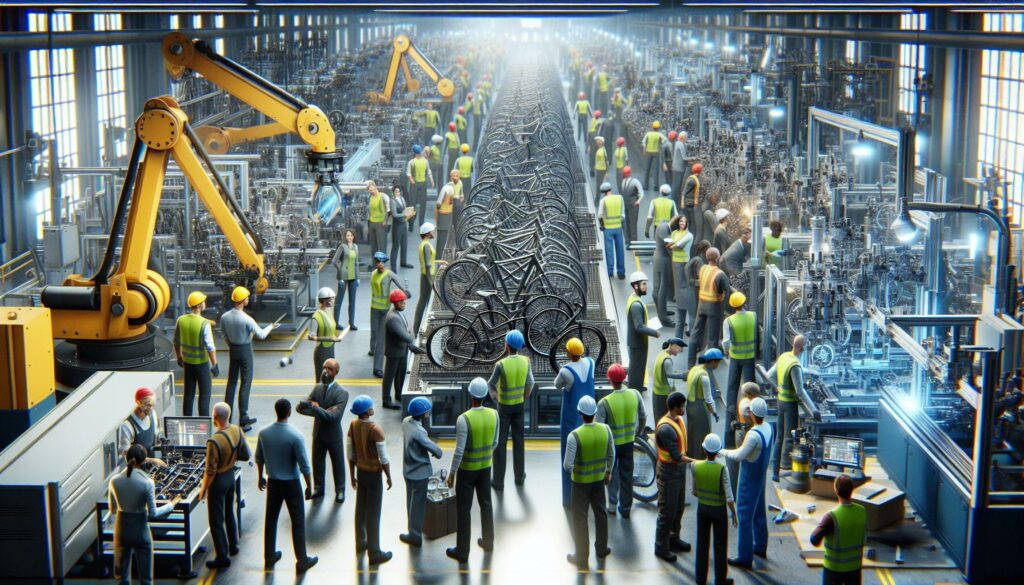I’ve often noticed how the bicycle manufacturing industry relies heavily on specialized equipment and technology, making it crucial to understand where producers source these essential components. The factor market, also known as the resource market, is where manufacturers acquire the capital goods needed for bicycle production.
As someone who’s studied manufacturing processes, I can tell you that this specialized market connects equipment suppliers with bicycle manufacturers seeking everything from metal-forming machines to assembly line robotics. It’s fascinating to see how producers navigate this B2B marketplace to obtain the tools, machinery and technological solutions that transform raw materials into the bikes we ride today. The factor market plays a vital role in the production cycle by facilitating these important business-to-business transactions.
Key Takeaways
- The factor market (resource market) is where bicycle manufacturers purchase their essential equipment and technology for production.
- Key equipment categories include frame manufacturing machines, metal forming machinery, assembly line equipment, computer-aided design systems, and quality assurance technology.
- Manufacturers can source equipment through domestic suppliers, regional networks, international markets (particularly in Asia and Europe), and digital B2B marketplaces.
- Major trade shows and exhibitions like EUROBIKE and TAIPEI CYCLE serve as crucial marketplaces for comparing equipment and connecting with vendors directly.
- Digital platforms like Alibaba and industry-specific exchanges offer streamlined procurement processes with verified suppliers, secure payments, and integrated support services.
- Investment ranges for manufacturing equipment vary significantly, from $15,000 for basic tools to several million dollars for complete automated production systems.
In which Market would a Producer Buy the Equipment and Technology needed to Manufacture Bicycles?
Capital goods markets serve as specialized B2B marketplaces where bicycle manufacturers acquire the essential equipment and technology for their production facilities.
Types of Capital Equipment Needed
- Frame Manufacturing Equipment
- Tube cutting machines
- Welding stations
- Heat treatment furnaces
- Frame alignment jigs
- Metal Forming Machinery
- Hydraulic presses
- CNC bending machines
- Metal stamping equipment
- Die-casting systems
- Assembly Line Equipment
- Conveyor systems
- Automated wheel building machines
- Paint booths
- Quality control testing stations
- Computer-Aided Design (CAD) Systems
- 3D modeling software
- Frame geometry design tools
- Structural analysis programs
- Production Control Systems
- Enterprise Resource Planning (ERP) software
- Manufacturing Execution Systems (MES)
- Inventory management platforms
- Quality Assurance Technology
- Non-destructive testing equipment
- Precision measurement tools
| Equipment Category | Average Investment Range (USD) | Typical Lifespan (Years) |
|---|---|---|
| Frame Manufacturing | 250,000 – 500,000 | 8-12 |
| Metal Forming | 400,000 – 800,000 | 10-15 |
| Assembly Line | 300,000 – 600,000 | 7-10 |
| Testing Equipment | 150,000 – 300,000 | 5-8 |
Domestic Manufacturing Equipment Suppliers
Domestic suppliers form a critical network for bicycle manufacturers seeking equipment within their national borders. These suppliers offer competitive advantages through localized support services immediate availability.
Regional Supply Networks
Regional supply networks connect bicycle manufacturers with equipment suppliers across specific geographic zones. The networks include manufacturing hubs in Detroit Michigan Cincinnati Ohio Seattle Washington where specialized machinery dealers cluster near transportation routes. Key advantages of regional networks include:
- Reduced shipping costs for large equipment delivery
- Access to manufacturer-certified technicians within 4-hour response times
- Streamlined customs clearance for domestically sourced machinery
- Integration with local industrial development initiatives
- Same-day parts availability from regional warehouses
- Frame welding stations ($15,000-$45,000)
- Automated wheel truing machines ($8,000-$25,000)
- Paint booth systems ($30,000-$100,000)
- Assembly line conveyors ($20,000-$60,000 per section)
| Equipment Type | Average Lead Time | Installation Support |
|---|---|---|
| Welding Systems | 2-3 weeks | On-site technician |
| Paint Systems | 4-6 weeks | Full team setup |
| Assembly Lines | 3-4 weeks | Project manager |
| Testing Equipment | 1-2 weeks | Remote support |
International Industrial Machinery Markets
International industrial machinery markets provide bicycle manufacturers with specialized equipment sourcing opportunities across global manufacturing hubs. These markets feature established networks of suppliers offering diverse technological solutions for bicycle production.
Asian Manufacturing Equipment Suppliers
Asian manufacturing equipment suppliers dominate the global market for bicycle production machinery, centered in industrial regions across China, Taiwan Japan. Leading manufacturers like DMG Mori (Japan) Haas Automation (China) supply essential equipment including:
- CNC tube bending machines ($50,000-$150,000)
- Automated welding systems ($75,000-$200,000)
- Frame alignment fixtures ($15,000-$45,000)
- Paint application systems ($100,000-$300,000)
| Country | Equipment Type | Price Range (USD) | Lead Time |
|---|---|---|---|
| China | Basic Assembly Lines | $200K-$500K | 60-90 days |
| Taiwan | Precision Tools | $50K-$150K | 30-45 days |
| Japan | Robotics Systems | $300K-$800K | 90-120 days |
- German manufacturers specializing in automated assembly systems
- Italian producers creating custom frame-building equipment
- Swiss companies developing precision measurement tools
- Dutch firms offering specialized painting systems
| Provider Location | Technology Focus | Investment Range (USD) |
|---|---|---|
| Germany | Assembly Automation | $500K-$2M |
| Italy | Frame Construction | $300K-$900K |
| Switzerland | Quality Control | $200K-$600K |
| Netherlands | Surface Treatment | $250K-$750K |
Industrial Trade Shows and Exhibitions
Trade shows serve as primary marketplaces for bicycle manufacturers to source equipment directly from multiple vendors while comparing specifications and prices in person. These events showcase the latest manufacturing technologies and automation solutions specific to bicycle production.
Major Industry Events
The EUROBIKE Show in Frankfurt features 500+ equipment vendors specializing in bicycle manufacturing machinery. TAIPEI CYCLE in Taiwan hosts 3,000 exhibitors displaying production equipment ranging from automated welding systems to paint application technology. The China International Bicycle Fair presents 2,500+ machinery suppliers across 100,000 square meters of exhibition space. Key equipment categories at these shows include:
- Frame fabrication systems ($50,000-$200,000)
- Automated wheel building machines ($75,000-$150,000)
- Paint application systems ($30,000-$100,000)
- Quality control equipment ($25,000-$80,000)
- Assembly line automation ($100,000-$500,000)
Networking Opportunities
Trade shows create direct connections between equipment manufacturers and bicycle producers through structured networking formats. The events include:
- One-on-one supplier meetings with pre-scheduled 30-minute appointments
- Technical workshops demonstrating new manufacturing equipment
- Industry roundtables focusing on production automation trends
- Equipment demonstration zones for hands-on testing
- Evening networking receptions with 200+ industry professionals
| Outcome | Average Success Rate |
|---|---|
| Equipment Purchase Deals | 65% |
| Service Contracts | 45% |
| Technology Partnerships | 35% |
| Joint Development Projects | 25% |
Digital Marketplaces for Manufacturing Equipment
Digital marketplaces connect bicycle manufacturers with equipment suppliers through specialized platforms designed for industrial machinery transactions. These online venues streamline the procurement process through automated matching algorithms specialized verification systems.
Online B2B Platforms
Leading B2B platforms like Alibaba Global Sources ThomasNet facilitate equipment sourcing for bicycle manufacturing operations. These platforms list 5,000+ verified suppliers offering essential machinery including:
- CNC tube cutting machines ($15,000-$45,000)
- Automated welding systems ($25,000-$75,000)
- Paint booth installations ($30,000-$100,000)
- Assembly line conveyors ($20,000-$60,000)
The platforms provide secure payment processing integrated logistics support manufacturer ratings manufacturer certifications. Each listing includes detailed specifications lead times warranty information technical documentation.
Industry-Specific Exchanges
Specialized bicycle industry exchanges focus exclusively on manufacturing equipment for bike production. Key platforms include:
| Exchange Name | Geographic Focus | Equipment Categories | Average Transaction Value |
|---|---|---|---|
| BikeEquip.com | Global | Frame Building, Assembly | $50,000-$200,000 |
| Cycletech Exchange | Europe | Finishing, Testing | $25,000-$150,000 |
| VeloPro Market | Asia-Pacific | Automation, Robotics | $100,000-$500,000 |
These exchanges offer:
- Pre-vetted supplier networks
- Industry-standard compliance verification
- Equipment financing options
- Installation service coordination
- Technical support connections
- Parts inventory management
- Maintenance scheduling systems
Each platform maintains strict quality control measures through independent equipment inspections performance verifications technical audits.
Bicycle Manufacturer
I’ve explored the complex web of markets where bicycle manufacturers source their essential equipment and technology. The factor market emerges as the primary destination with both domestic and international suppliers playing crucial roles in the industry’s ecosystem.
Trade shows digital marketplaces and specialized B2B platforms have revolutionized how manufacturers connect with equipment suppliers. These venues offer unprecedented access to cutting-edge technology while fostering valuable business relationships.
Whether through regional supply networks or global industrial machinery markets manufacturers can now find exactly what they need to produce high-quality bicycles efficiently. This interconnected marketplace continues to evolve making it easier than ever to source the right equipment at competitive prices.

